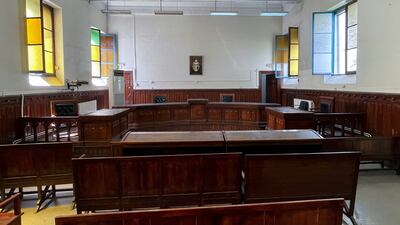Tunisian judges began a week-long strike on Monday to protest against President Kais Saied's firing of 57 of their colleagues.
Mr Saied removed the judges from their roles last week in a new decree which extended his control of the judiciary. Four judges unions have pushed back, calling for a nationwide strike against the president's “continued interference in the judiciary”.
They have accused the premier of laying off judges “without the slightest recourse to disciplinary procedures” in an affront to the constitution.
The president had at an earlier cabinet meeting accused unnamed judges of corruption, stalling “terrorism” cases, sexual harassment, collusion with political parties and obstruction of justice.
Mourad Massoudi, head of the Young Judges' Union, told AFP on Monday that “the strike started today at all courts across the country, and appears to have been widely observed”.
Courts will stay open for terrorism cases.
“Issuing a decision without questioning or any internal disciplinary action leads to the creation of a fragile judiciary which only benefits the president,” Afif Jaibi, a judge at the Court of Cassation participating in the strike, told The National.
Ahmed Abidi, a judge specialising in family cases at the regional court of Fahs, lost his role in the firings and found out in the newspaper. He was questioned months ago when he had the same name as someone involved in another case but was cleared by the Ministry of Interior. He even received an apology from the national guard in Fahs.
“I was not even informed of the decision, I only read it in media … I don’t even deal with major cases, I was shocked,” he told The National.
“This is a tyrannical decision. The judiciary is a small community and we know each other. The majority of these judges are clean and such a decision only targets their reputation and livelihoods.

Mr Abidi said the government was attacking the independence of the judiciary and called for members of the public to stand against the firings.
“We’re calling on the people to wake up, as another day they might stand before a judge that is intimidated by police … all judges now are working under pressure and threat of security/police reports. It is quite hard for the judiciary to be fair if judges are living under intimidation,” he added.
Last year Mr Saied sacked his government and suspended parliament. He later dissolved the assembly, seizing control of the judiciary and moving to rule by decree.
Mr Saied has inveighed against corruption and repeatedly called for a total overhaul of the country's political system. He has called a referendum on the new constitution to take place on July 25 — exactly a year after he seized power.
He has appointed academic Sadok Belaid to head an advisory committee to draft the document. The process excludes political parties from participating in the restructuring of the government.
Rawdha Karrafi, honorary president of the Tunisian Magistrates Association, described the current state of affairs as “horrific”.
“Today, we’re not only in the presence of the legitimation of tyranny, we are seeing the enactment of tyranny,” she said.
“The situation is horrific and scary in terms of the independence of the judiciary and judges. Judges cannot be ordered around neither by the president nor parties nor lobby or pressure groups, the judge is the impartial party that only applies the law which comes at the unliking of the president.”

